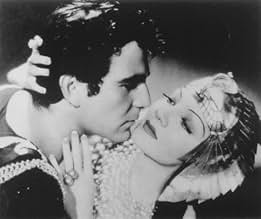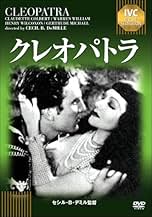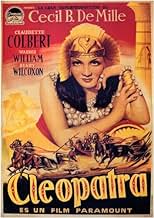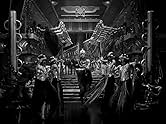IMDb-BEWERTUNG
6,8/10
5014
IHRE BEWERTUNG
Füge eine Handlung in deiner Sprache hinzuThe man-hungry Queen of Egypt leads Julius Caesar and Marc Antony astray, amid scenes of DeMillean splendor.The man-hungry Queen of Egypt leads Julius Caesar and Marc Antony astray, amid scenes of DeMillean splendor.The man-hungry Queen of Egypt leads Julius Caesar and Marc Antony astray, amid scenes of DeMillean splendor.
- 1 Oscar gewonnen
- 2 Gewinne & 4 Nominierungen insgesamt
Ian Maclaren
- Cassius
- (as Ian MacLaren)
Ferdinand Gottschalk
- Glabrio
- (Gelöschte Szenen)
Jayne Regan
- Lady Vesta
- (as Jane Regan)
Empfohlene Bewertungen
Was Demille more daring than any other director or was he just clueless? What does one say when the curtains close on Antony and Cleopatra and suddenly the screen erupts with more sexual symbols than any moment in Hollywood's history? From the phallic symbols (oars) to the yonic symbols (curtains) until finally both orgasmically mesh together in a final combination (a drummer with his drum), the scene tells us we're viewing the artistry of a kinky genius or a shameless carney.
And along with the jawdropping visuals, the film is crammed with juicy Demille-like dialog. Unlike other Demille films, this one has a wonderful cast to deliver his unique oneliners, and there are so many. My own favorites are the moments of dumbdowned Shakespeare. Instead of speaking of Cleopatra's "infinite variety" we are told she is always "many colored" and, of course, instead of "Et tu, Brute?" we get, "You? You too, Brutus?" What can you say about a movie in which Julius Ceasar says "Nope" to his senators? Nothing. One can only savor every delicious moment of camp that only a Demille could serve up.
The Taylor/Burton version is more spectacular, more intelligent, and more historical, but for those who relish kitsch--and this story always lends itself to it--this version is the best.
And along with the jawdropping visuals, the film is crammed with juicy Demille-like dialog. Unlike other Demille films, this one has a wonderful cast to deliver his unique oneliners, and there are so many. My own favorites are the moments of dumbdowned Shakespeare. Instead of speaking of Cleopatra's "infinite variety" we are told she is always "many colored" and, of course, instead of "Et tu, Brute?" we get, "You? You too, Brutus?" What can you say about a movie in which Julius Ceasar says "Nope" to his senators? Nothing. One can only savor every delicious moment of camp that only a Demille could serve up.
The Taylor/Burton version is more spectacular, more intelligent, and more historical, but for those who relish kitsch--and this story always lends itself to it--this version is the best.
Am also an admirer of many epics, especially medieval and biblical ones. The Antony and Cleopatra story is a timeless one, with Shakespeare's play having so many memorable quotes that stick in the mind for a long time. The cast is a talented one, with many giving fine performances elsewhere. Cecil DeMille was one of the kings when it came to epics lavish in spectacle, one of the finest examples being the wonderful 'The Ten Commandments'.
So 1934's 'Cleopatra' was seen with mixed expectations, am saying mixed because another epic re-telling of the 'Antony and Cleopatra' story was released in 1963 with a great cast (on paper) but to very overblown and heavily flawed effect. After watching it, 'Cleopatra' was a little better than expected as it was above mixed feelings at least. It is more romantic comedy and soap opera with a love triangle set in biblical times with the bare bones of the story rather than the real thing or being accurate, but it is a visually grand affair and is enjoyable as long as one doesn't expect a massive amount. Between this and the 1963 film, this to me is better by quite some way. Didn't care for that film very much, moderately liked this.
'Cleopatra' does have things that are easy to criticise certainly. Really didn't think much of Henry Wilcoxen as Antony personally, a character that should be conflicted and authoritative but Wilcoxen came over as too dull and bumbling (even Antony in the 1963 film wasn't this much of a lummox). Didn't always detect much passion between him and Claudette Colbert.
It is easy to understand why some criticise the dialogue too, it's better than that in the 1953 film but can be too heavy on the camp that it becomes very hammy and any laughter is not always intentional. And also the pacing, which is leaden in spots due to a few scenes going on for too long. As captivating as the scene on the barge is in visuals and staging it kind of goes on forever.
There are a lot of virtues however in 'Cleopatra'. The best aspects being the production values and Colbert. The way the film looks and its spectacle is the very meaning of lavish and grand. It looks expensive without being over-produced, it is not hard to see why the cinematography won an Oscar and the sets are a jaw-dropping feast. The costumes are of pure splendour, Colbert looks stunning in her garb. She sizzles in her acting too, in sensuality, shrewdness and wit. Of the two male leads, Warren William fares a lot better. Very theatrical (not unheard of for Caesar though) but he engages with the drama very well and at least seems to know how to approach his role, his chemistry with Colbert is more passionate too. Unrecognisable C. Aubrey Smith brings the conflicted edge, nuance and nobility to Enorbarbus that Wilcoxen's Antony should have had.
DeMille is very at home in the more spectacle-heavy moments without making them too overblown or stuffy. The music has the rousing splendour that fits the story well and adds to it. The dialogue is far from perfect but generally entertains and brought a few smiles to my face. There are memorable moments visually and how they're staged, those miniatures still look impressive. The story doesn't get too into overwrought soap opera territory and even if there is not much meat to the material it doesn't bore.
Overall, above average and a little better than expected but didn't wow me. 6.5/10
So 1934's 'Cleopatra' was seen with mixed expectations, am saying mixed because another epic re-telling of the 'Antony and Cleopatra' story was released in 1963 with a great cast (on paper) but to very overblown and heavily flawed effect. After watching it, 'Cleopatra' was a little better than expected as it was above mixed feelings at least. It is more romantic comedy and soap opera with a love triangle set in biblical times with the bare bones of the story rather than the real thing or being accurate, but it is a visually grand affair and is enjoyable as long as one doesn't expect a massive amount. Between this and the 1963 film, this to me is better by quite some way. Didn't care for that film very much, moderately liked this.
'Cleopatra' does have things that are easy to criticise certainly. Really didn't think much of Henry Wilcoxen as Antony personally, a character that should be conflicted and authoritative but Wilcoxen came over as too dull and bumbling (even Antony in the 1963 film wasn't this much of a lummox). Didn't always detect much passion between him and Claudette Colbert.
It is easy to understand why some criticise the dialogue too, it's better than that in the 1953 film but can be too heavy on the camp that it becomes very hammy and any laughter is not always intentional. And also the pacing, which is leaden in spots due to a few scenes going on for too long. As captivating as the scene on the barge is in visuals and staging it kind of goes on forever.
There are a lot of virtues however in 'Cleopatra'. The best aspects being the production values and Colbert. The way the film looks and its spectacle is the very meaning of lavish and grand. It looks expensive without being over-produced, it is not hard to see why the cinematography won an Oscar and the sets are a jaw-dropping feast. The costumes are of pure splendour, Colbert looks stunning in her garb. She sizzles in her acting too, in sensuality, shrewdness and wit. Of the two male leads, Warren William fares a lot better. Very theatrical (not unheard of for Caesar though) but he engages with the drama very well and at least seems to know how to approach his role, his chemistry with Colbert is more passionate too. Unrecognisable C. Aubrey Smith brings the conflicted edge, nuance and nobility to Enorbarbus that Wilcoxen's Antony should have had.
DeMille is very at home in the more spectacle-heavy moments without making them too overblown or stuffy. The music has the rousing splendour that fits the story well and adds to it. The dialogue is far from perfect but generally entertains and brought a few smiles to my face. There are memorable moments visually and how they're staged, those miniatures still look impressive. The story doesn't get too into overwrought soap opera territory and even if there is not much meat to the material it doesn't bore.
Overall, above average and a little better than expected but didn't wow me. 6.5/10
Spectacular DeMille hokum that, like most of his work, is hard to dislike despite its flaws. Say what you will about Cecil B. DeMille but he knew how to put on a show. The sets, costumes, and pageantry are excellent. The actors are all very enjoyable even if they ham it up some. Claudette Colbert is sexy and a treat to watch. Warren William's Julius Caesar seems like he would be more at home shooting craps or hustling pool than ruling Rome. Henry Wilcoxon is quite good as Marc Antony. The rest of the cast is solid, as DeMille supporting casts usually were. I have no sympathy for history buffs who gripe about this movie's failure to adhere to historical accuracy. If you watched a movie, especially a C.B. DeMille movie, looking for a history lesson then the fault is on you and not him. It's a fun piece of escapism loosely based on real people and events. Lighten up and enjoy the movie.
I have been very fond of this movie for years, particularly as compared with Fox's bloated monstrosity of 1963. Colbert is admittedly somewhat miscast (her face is altogether Parisienne), but she handles the part with considerable charm. Warren William, usually a very limited actor, is as good a Caesar as I have seen on film, commanding and uncomfortable by turns; while Henry Wilcoxon is the definitive Mark Antony, laughing, brawling, swaggering, crude and brooding. C. Aubrey Smith as Enobarbus, the last of the hardcore Roman republicans, is perfect. Victor Milner's cinematography is superb, if old-fashioned. There is one magnificent pullback shot aboard Cleopatra's barge, with more and more stuff entering the frame, which as pure cinema is worth more than all four hours of the Liz Taylor version for my money. Shakespeare and Shaw have both been drawn upon here and there, and the movie has generally good (and fun) dialogue, not always one of DeMille's strengths. Consider also the scene of Cleopatra's entrance into Rome: contrary to DeMille's usual reputation, this scene is underplayed, depicting a plausible parade through a very real Roman street with authentic trappings, compared to the outrageously bogus and overblown spectacle given us in 1963. A word is also in order for the music of Rudolph Kopp, an extremely obscure Hollywood composer, who turns in an atmospheric score redolant of the old silent movies. This style is easy to make fun of, but see how effective it is in the highly theatrical opening credits! DeMille used silent film technique well into the talkie era, particularly in crowd scenes, and it still works. The battle scenes are the weakest point, since evidently Paramount ran out of cash and C.B. had to make do with a bunch of short shots put together with Russian cutting; nevertheless, this is still as good a picture on the subject as has yet been made, a bit of extravagant old Hollywood at its most polished.
I wasn't looking forward to this one as much as THE SIGN OF THE CROSS (considered by many as De Mille's best film) but I must say that I was just as impressed by it. The pacing here is smoother, and we do get to see some wonderful action montages towards the end as opposed to the rather middling arena stuff of CROSS.
Claudette Colbert, too gets a lot more coverage this time around and certainly clinches the title role far better than the positively annoying Elizabeth Taylor in the ill-fated 1963 version. However, the male leads here are less interesting, for lack of a better word: Henry Wilcoxon and Warren William are adequate but, naturally, no match for the thespian skills of Richard Burton and Rex Harrison respectively.
The supporting cast is notable (Ian Keith, Irving Pichel, Joseph Schildkraut, C. Aubrey Smith) and the film features a number of great scenes: Caesar's murder (partly filmed in a POV shot), following which is a delicious jibe at Antony's famous oratory during Caesar's funeral as envisioned by Shakespeare; the long - and justly celebrated - barge sequence, in which Antony (intent on teaching Cleopatra, whom he blames for Caesar's death, a lesson) ends up being completely won over by her wiles; Cleopatra's own death scene is simply but most effectively filmed.
Like in THE SIGN OF THE CROSS, the film's production values are truly awe-inspiring and, in fact, Victor Milner was awarded with a well-deserved Oscar for his lush cinematography here. Needless to say, De Mille's take on Cleopatra, despite feeling hurried since it runs for less than half its length, is a more satisfying viewing experience than the stultifyingly dull, overblown and misguided (if still worthwhile and not quite as catastrophic as the history books would have it) later version.
Claudette Colbert, too gets a lot more coverage this time around and certainly clinches the title role far better than the positively annoying Elizabeth Taylor in the ill-fated 1963 version. However, the male leads here are less interesting, for lack of a better word: Henry Wilcoxon and Warren William are adequate but, naturally, no match for the thespian skills of Richard Burton and Rex Harrison respectively.
The supporting cast is notable (Ian Keith, Irving Pichel, Joseph Schildkraut, C. Aubrey Smith) and the film features a number of great scenes: Caesar's murder (partly filmed in a POV shot), following which is a delicious jibe at Antony's famous oratory during Caesar's funeral as envisioned by Shakespeare; the long - and justly celebrated - barge sequence, in which Antony (intent on teaching Cleopatra, whom he blames for Caesar's death, a lesson) ends up being completely won over by her wiles; Cleopatra's own death scene is simply but most effectively filmed.
Like in THE SIGN OF THE CROSS, the film's production values are truly awe-inspiring and, in fact, Victor Milner was awarded with a well-deserved Oscar for his lush cinematography here. Needless to say, De Mille's take on Cleopatra, despite feeling hurried since it runs for less than half its length, is a more satisfying viewing experience than the stultifyingly dull, overblown and misguided (if still worthwhile and not quite as catastrophic as the history books would have it) later version.
Wusstest du schon
- WissenswertesWhen Cecil B. DeMille was in pre-production on this film, he asked to screen the original Cleopatra (1917) with Theda Bara. No prints could be found in Los Angeles, so a copy was borrowed from the Fox office in New York. After DeMille viewed the film, it was sent back to Little Ferry, NJ. On 7/9/37 a fire at the storage facility destroyed almost all of Fox's known archived prints, most likely including "Cleopatra". The screening for DeMille's company, on 2/15/34, may have been the last time anyone saw the legendary film. However, on September 14, 2023, 42 seconds of extremely rare footage of the final act in which Cleopatra prepares to die as the Roman Legion marches upon her palace was procured from a 1920's toy film projector and presented on YouTube.
- PatzerThe main doors to Cleopatra's chambers have modern metal hinges.
- Zitate
Cleopatra: Together we could conquer the world.
Julius Caesar: Nice of you to include me.
- Alternative VersionenThe movie was released in Germany with German direction by Kurt Bleines and German dialogue by Helmut Brandis and Helena von Fortenbach.
- VerbindungenEdited into Spisok korabley (2008)
Top-Auswahl
Melde dich zum Bewerten an und greife auf die Watchlist für personalisierte Empfehlungen zu.
Details
- Laufzeit
- 1 Std. 32 Min.(92 min)
- Farbe
- Seitenverhältnis
- 1.37 : 1
Zu dieser Seite beitragen
Bearbeitung vorschlagen oder fehlenden Inhalt hinzufügen







































